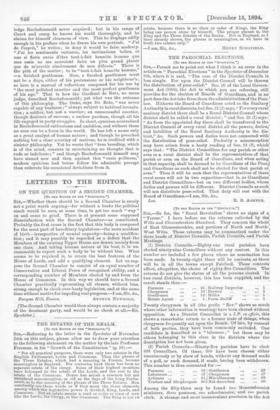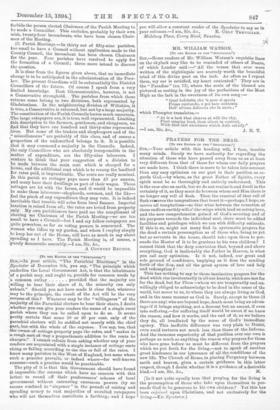[TO THE EDITOR OF THE " SPEOTAT3R.1
SIR,—So far, the "Rural Revolution" shows no signs of a "Terror." I have before me the returns collected by the: Wilts and Gloucestershire Standard. They concern the whole of East Gloucestershire, and portions of North and North- West Wilts. These returns may be summarised under the three heads of District Councils, Parish Councils, and Parish Meetings.
(1) District Councils.—Eighty-one rural parishes have elected ninety-nine Councillors without any contest. In this number are included a few places where no nomination has been made. In twenty-eight there will be contests, as there, will be in all the towns except Fairford. These contests affect, altogether, the choice of eighty-five Councillors. The returns do not give the status of all the persons elected. In two rural districts, however, this has been supplied, and the- result stands thus :— Farmers
... 21 Railway Inspector 1 Clergymen
... 13
Brewer 1 Gentlemen
12
Miller ...
... 1
Estate Agent
1
Farm Bailiff ..,
1 Twenty clergymen in all (the prefix "Rev." shows so much where other information is wanting) have been elected without opposition. As a District Councillor is a J.P. ex officio, this shows a remarkable return to a former state of things, when clergymen frequently sat upon the Bench. Of late, by consent of both parties, they have been commonly excluded. One candidate is described as a " labourer ; " but there may be others belonging to this class in the districts where the- description has not been given.
(2) Parish Councils.—Ninety-five parishes have to elect 698 Councillors. Of these, 360 have been chosen either unanimously or by show of hands, without any demand made- of a poll, or such demand, if made, having been withdrawn.. This number is thus accounted for :- Farmers ... ...
95 Gentlemen
27
Labourers ... ... 57
Clergymen
909
... 17 Artisans ... ... 61 Miscellaneous
Traders and Shopkeepers
30
Not described ...
Among the fifty-three may be found two Nonconformist ministers, three postmen, one schoolmaster, and one parish clerk. A strange and most inconvenient provision in the Act
forbids the person elected Chairman of the Parish Meeting to be made a Councillor. This excludes, probably by their own wish, twenty-four incumbents, who have been chosen Chair- men of the Meeting.
(3) Parish Meetings.—In thirty out of fifty-nine parishes, too small to have a Council without application made to the County Council, the incumbent has been chosen Chairman for the year. Four parishes have resolved to apply for the formation of a Council; three more intend to discuss the question. It is clear from the figures given above, that no immediate change is to be anticipated in the administration of the Poor- law. The present Guardians will be substantially the District Councillors of the future. Of course I speak from a very limited knowledge. East Gloucestershire, however, is not a Conservative stronghold. The parishes from which these returns come belong to two divisions, both represented by Gladstonians. In the neighbouring division of Wiltshire, it is true, a Conservative is returned, but not by a large majority. The constitution of the Parish Councils leaves much uncertain. The large ratepayers are, it is true, well represented. Limiting this description to the farmers, gentlemen, and clergymen, we nd that they have one hundred and thirty-nine representa- tives. But some of the traders and shopkeepers and of the " miscellaneous " are probably of this class, and of course a proportion of the =described belongs to it. It is possible that it may command a majority in the Councils. Indeed, the only Councillors who are absolutely irresponsible in the platter of expenditure, are the fifty-nine labourers. I ,orenture to think that your suggestion of a division to be made between the main rent which is charged for a house, and the additional rent which is to recoup the landlord
or rates paid, is impracticable. The rents are really nominal. In this parish no cottager pays more than £3 per annum, and many have their dwellings as part of their wages. These tcottages are let with the farms, and it would be impossible to make these labourers—shepherds, cowmen, and the like— ;eel the pinch of any expenditure they may vote. It is indeed inevitable that trouble will arise from local finance. Imperial taxation is raised from all; the rates are levied from property only. My own parishioners have paid me the compliment of electing me Chairman of the Parish Meeting—we are too small to have a Council—but I and my fellow-ratepayers are 'quite powerless, as far as voting powers is concerned. The woman who tidies up my garden, and whom I employ simply to keep her out of the House, will have as much to say about spending as I have. The Parish Meeting is, of course, a purely democratic tissembly.—I am, Sir, &a.,
A. COUNTRY RECTOR.









































 Previous page
Previous page